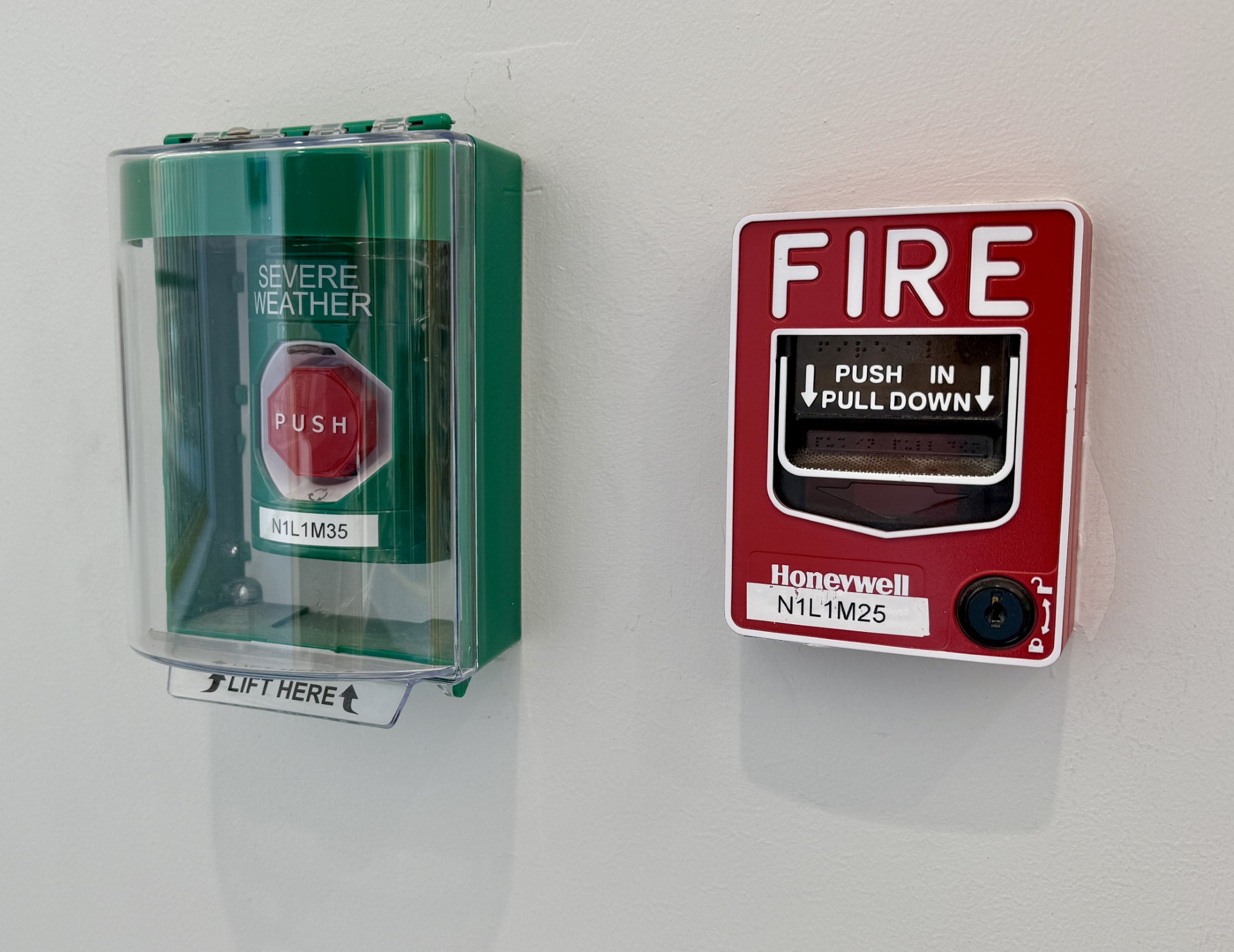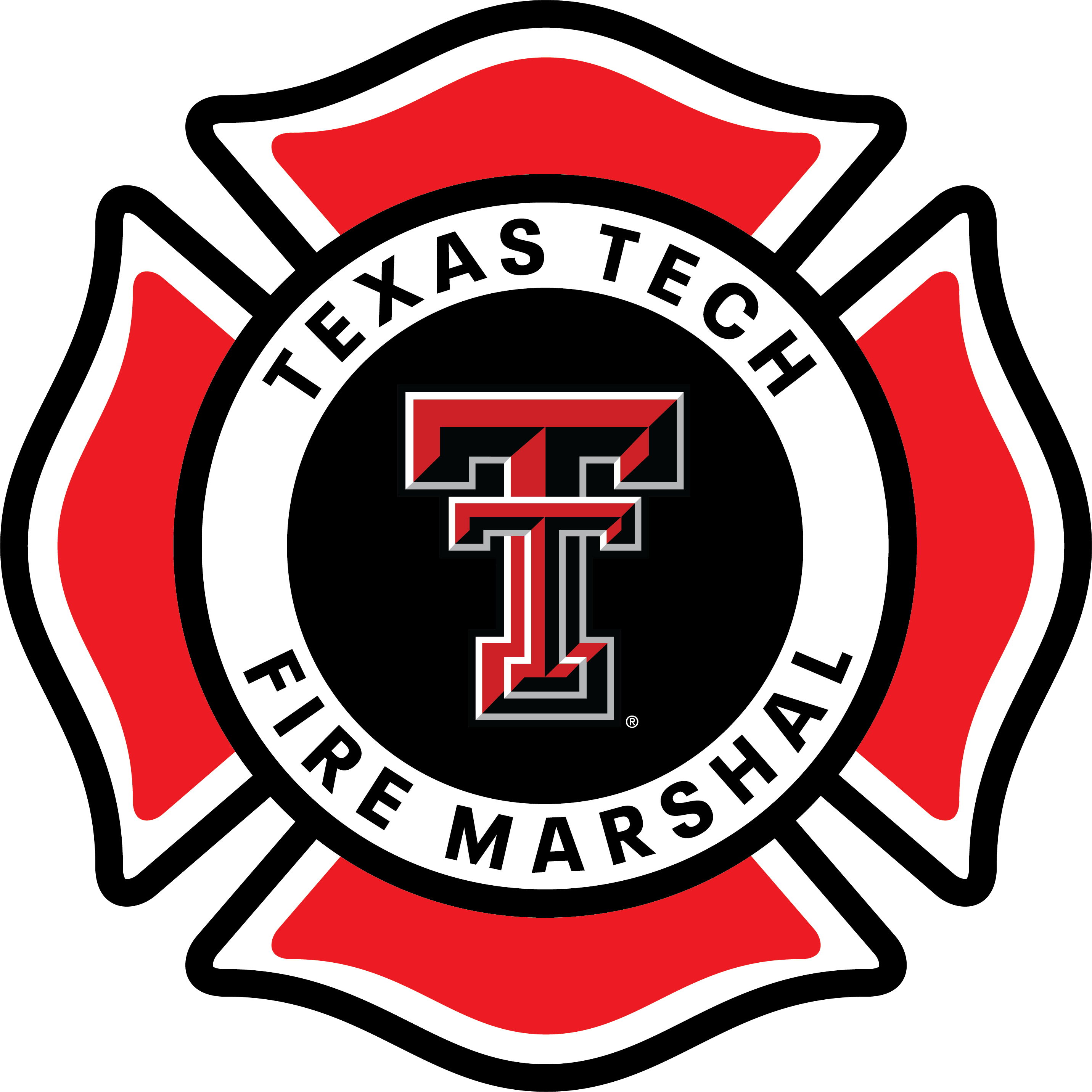Common Fire & Life Safety Issues
False Alarms
False alarms are any fire alarms caused by non-emergency and accidental situations such as negligent cooking practices, vaping or criminal behavior. Each false alarm can force hundreds of people to needlessly evacuate, disrupting classes, sleep, and essential campus operations. False alarms breed complacency, meaning people won’t take real alarms seriously. This can be a deadly mistake during a real emergency. Emergency Responders must treat every alarm as real, putting them in harm’s way while responding on busy roadways and pulling them away from true emergencies where lives may be at stake. Intentionally or maliciously causing a false fire alarm on campus is a crime and a felony offense in the state of Texas.
Smoking & Vaping
Texas Tech is a smoke-free and tobacco-free environment. All tobacco products, including cigarettes, electronic cigarettes and smokeless tobacco, are prohibited in all facilities.
- Vaping & E-Cigarettes – Vaping is the leading cause of false alarms in Texas Tech residence halls. Every time someone vapes inside a campus building there is a risk of triggering the fire alarm. Smoke detectors cannot differentiate between smoke caused by fire and vapor created by an e-cigarette.
- Additionally, e-cigarettes often are equipped with lithium-ion batteries, which can pose an extreme fire hazard if damaged, improperly charged, improperly maintained, are old, and/or malfunctioning. The risk is multiplied by the use and misuse of unregulated and cheaply manufactured products and devices.
- Lithium-ion battery fires occur suddenly, spread rapidly, produce extremely toxic smoke and are extremely hard to extinguish. This presents serious risks to building occupants and emergency responders.
- Texas law prohibits minors (under age 21) from possessing, purchasing, consuming, or accepting cigarettes, e-cigarettes or tobacco products.
E-Scooters & E-Bikes
The use, operation, storage or charging of personal electric vehicles—including but not limited to e-scooters, e-bikes and e-skateboards—is prohibited inside all Texas Tech University buildings. Any unauthorized electric vehicles or devices found inside Texas Tech buildings are subject to immediate removal by the TTUFMO or other university personnel. The only exception to this policy is for electric personal mobility devices (such as electric wheelchairs) used by individuals with disabilities, as protected under the Americans with Disabilities Act (ADA).
- The prohibition of personal electric vehicles inside Texas Tech buildings is a critical fire safety measure. Devices such as e-scooters, e-bikes and e-skateboards commonly use lithium-ion batteries, which can pose an extreme fire hazard if damaged, improperly charged, improperly maintained, are old and/or malfunctioning. The risk is multiplied by the use and misuse of unregulated and cheaply manufactured products and devices.
- Lithium-ion battery fires occur suddenly, spread rapidly, produce extremely toxic smoke and are extremely hard to extinguish. This presents serious risks to building occupants and emergency responders.
- We appreciate your cooperation in keeping our campus safe by keeping these devices out of our buildings.
Cooking
Cooking fires are the leading cause of fire-related incidents in both homes and campus settings. Unattended cooking and improper use of appliances are the top causes of fire alarms. According to the National Fire Protection Association (NFPA), cooking equipment accounts for nearly 50% of all reported fires in dormitories, and other campus locations.
- Remember, air fryers and hot plates are prohibited on campus.
-
- Cooking Safety Tips
-
-
- Never leave food unattended while it’s cooking
-
-
-
- Maintain a clean and tidy cooking area that is free of items that catch on fire easily, such as cloth (curtains, potholders, towels, etc.), paper (cookbooks, paper towels, food packaging, newspapers, etc.) and plastic (food packaging, storage containers, etc.)
-
-
-
- Never plug microwaves into extension cords, and never microwave metal containers, utensils or tinfoil
-
-
-
- For more information on cooking safety, check out these downloadable resources from the NFPA
-
- In the Event of a Fire:
-
- Call 911 immediately and first!
- If possible, turn off or unplug the appliance.
- Close the door on the way out.
- Notify other occupants and evacuate the building (this is most easily achieved by pulling the fire alarm pull station).
- When first responders arrive, let them know you called and why you did.
Candles & Incense
Electricity
Misuse of electric appliances and equipment is a leading cause of fires which result in property loss, injuries and death. When purchasing or using electrical devices, equipment and appliances, make sure they are a listed device by a nationally recognized testing laboratory, such as UL (Underwriters Laboratories) and used in accordance with the manufacturer’s instructions.
- High Amperage Appliances
-
- High amperage appliances must be plugged directly into a wall receptacle and never into extension cords, surge protectors or power strips. Examples of high-amperage appliances can include but are not limited to microwave ovens, toaster ovens, air fryers, refrigerators, freezers, space heaters, coffee makers, electric kettles, hair dryers, griddles, waffle makers, hot plates and air conditioners. Try to only plug one high-amperage item into each receptacle, and if it is not feasible, try and restrict usage to operating only one high amperage appliance at a time on a single circuit.
- Space Heaters
- TTUFMO does not encourage the use of space heaters, but they are generally permitted
in Texas Tech facilities under certain conditions. Any space heater used on campus
must meet the following requirements:
- Have a UL listing or equivalent safety certification
- TTUFMO does not encourage the use of space heaters, but they are generally permitted
in Texas Tech facilities under certain conditions. Any space heater used on campus
must meet the following requirements:
-
-
- Be equipped with a tip-over safety switch
-
-
-
- Preferably be of the infrared style
-
- Please note:
- Some older, ceramic-style heaters may be prohibited in university buildings
-
- Oil-filled, kerosene, propane and other heaters that use flammable or combustible fuels are prohibited inside Texas Tech facilities
- Due to the wide variety of models and potential safety concerns, we ask that you contact our office before using a space heater in any university facility.
- Extension Cords & Surge Protectors
-
- Never use an extension cord as a replacement for permanent wiring.
-
- Don’t run extension cords through doorways or under carpets.
-
- Make sure power strips and surge suppressors are designed to handle the loads you will be using them for.
-
- Plug power strips and surge protectors directly into a wall receptacle. Do not connect multiple power strips or surge protectors together.
-
- Avoid overloading circuits by plugging too many items into the same receptacle.
-
- Do not use "cube taps" and other similar devices that allow the connection of multiple appliances into a single receptacle.
-
- Relocatable power taps must have overcurrent protection (built-in circuit breaker).
- Never operate electrical appliances around bathtubs, showers or standing water.
- Use ground fault circuit interrupter (GFCI) protection when working where water is near electricity to protect against electric shock.
- Replace or repair frayed, loose or otherwise damaged cords on all electronics.
- Place lamps on level surfaces, away from combustible items, and use light bulbs that match the lamps’ recommended wattages. LED bulbs are recommended due to their longer lifespan and because they produce less heat.
- Shut off the circuit and have it checked by an electrician if any switches or receptacles feel warm or appear burnt or discolored. Discolored electrical equipment, switches or receptacle plates could indicate that the electrical wiring is overheating.
- Remember: symptoms of potential wiring problems include lights that dim or flicker, frequent blown fuses or circuit breakers that trip frequently. Circuit breakers generally don’t trip because they are the problem; it is most commonly because there is a problem on the circuit (such as too many devices plugged in, damaged wiring, etc.).
Blocked Exits or Life Safety Equipment
- Locked, blocked or obstructed exits are an immediate danger to life safety and are prohibited.
- Furthermore, blocking or obstructing fire extinguishers, fire alarm pull stations and other life safety equipment also poses a risk to building occupants and is also prohibited.
- If you see something you believe to be a fire or life safety hazard on Texas Tech property, please report it to us immediately by calling (806) 742-0146 or by submitting a report here.

Gasoline
Gasoline storage inside Texas Tech buildings is prohibited. The only exception being for amounts not in excess of the code prescribed maximum allowable quantities, when stored in proper flammable liquids cabinets and in TTUFMO approved locations.
Each year gasoline causes several thousand fires in the U.S., many of which result in injury and death. Gasoline is a volatile liquid that constantly releases flammable vapors, which are heavier than air and accumulate at the lowest point in an area. If released inside a building, these vapors sink to floor level and spread out across the room, and if these vapors contact an ignition source, a flash-fire will likely result.
Gasoline General Safety Tips- Store gasoline outdoors in a garage or shed.
- Store gasoline in a tightly closed metal or plastic container designed, manufactured and approved specifically for gasoline storage. Do not store gasoline in glass or plastic containers not designed for the purpose of storing gasoline.
- Store only the amount of gasoline necessary to power equipment and machinery.
- Do not smoke while handling gasoline.
- Use caution when fueling machinery and automobile equipment.
- Never fuel machinery or equipment indoors and always let it cool before refueling.
- Place portable gasoline containers on the ground before filling and only fill them outdoors.
- Never fill portable containers inside a vehicle or in the bed of a truck to prevent a static charge from developing.
- Do not get in and out of automobiles while fueling. Although rare, this movement creates an electrical charge on your body that could spark a fire, especially during dry weather conditions.
Liquid Petroleum Gas (LPG)
LPG storage inside Texas Tech buildings is prohibited. The only exception being for amounts not in excess of the code prescribed maximum allowable quantities, when stored in proper flammable liquids cabinets and in TTUFMO approved locations.
Thousands of fires and explosions are caused by liquid petroleum gas (LPG) annually, and these fires and explosions are responsible for numerous injuries and deaths. LPG generally refers to propane and butane or a mixture of the two, which are flammable gases that are converted to a liquid before being stored within a cylinder or tank. When released from the container, LPG converts back to gas and expands significantly. If this expanding gas contacts an ignition source, a fire or explosion can occur. When first released, the gas is cold and heavier than the surrounding air, which creates a “cloud” of heavy gas that will stay close to the ground and collect in low areas.
LPG General Safety Tips- Never store or operate an LPG-powered grill or appliance indoors.
- Always handle LPG-powered equipment cautiously and according to the manufacturers’ instructions.
- Have LPG equipment inspected by a professional for leaks and faulty parts on a regular basis.
- Follow the manufacturer’s instructions carefully when lighting pilot lights.
- Leave the area immediately and call the fire department from outside the building if you smell a strong odor of gas.
- LPG must be stored outdoors in a secured storage cabinet.
Texas Tech Fire Marshal
-
Address
413 Flint Ave., Lubbock, Texas 79409 -
Phone
806-742-0146 -
Email
fire.safety@ttu.edu

